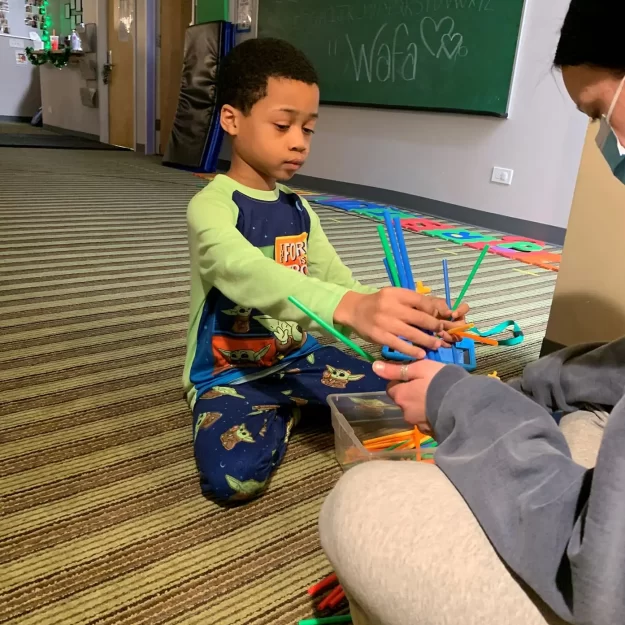ABA Therapy
What is ABA Therapy?
Applied Behavior Analysis analyzes relationships between a child’s environment and behavior, and applies the principles of positive reinforcement (rewards), and the adjustment of antecedents (what happens before the behavior) and consequences (what happens after the behavior) to increase or decrease significant behaviors. ABA Therapy is often seen as the “gold-standard” of Behavioral Therapy for children with Autism.
ABA Therapy Can Help Your Child With These Skills
- Adaptive and self-care skills
- Attending and social referencing
- Cognitive functioning
- Community participation
- Coping and tolerance skills
- Emotional development
- Family relationships
- Language and communication
- Play and leisure skills
- Pre-academic skills
- Reduction of interfering or inappropriate behaviors
- Safety skills
- Self-advocacy and independence
- Self-management
- Social relationships
- Vocational skills
ABA Therapy at Our Clinic
Our therapists will work with the child and family in a team-based approach to provide support, strategies, and interventions to help the child make cognitive behavioral progress. Here’s what you can expect:
- Within the ABA session, learning and play are intertwined! While we work to help your child master goals and learn new skills, we also aim for your child to enjoy their time whenever they’re at Milestone Therapy.
- Toy closets full of exciting toy options are available for your child to choose from, an indoor gym equipped with a swing, slide and other toys to encourage gross motor movement, and a craft room with crayons, paint, shaving cream and a variety of choices for fine motor activities and arts and crafts may be a few of the areas your child spends time in during their ABA session.
- Our therapists will use what your child loves to bring about naturalistic learning opportunities. As your child continues to learn, treatment plans will be assessed and evolved to keep your child engaged and learning!

ABA Therapy FAQs
While there is no age limit in which ABA becomes ineffective, ABA Therapy is most effective when provided on a consistent basis as soon as possible after diagnosis. Evidence does show that the earlier ABA treatment begins, the more likely positive long-term outcomes are established.
While a child may only be in an ABA Therapy session a certain number of hours during the week, the amount that the child should use ABA Therapy goes beyond that. For the child’s behavior to improve outside of the ABA Therapy session, it is important that parents and caregivers also become trained on the implementation of program goals. Part of the ABA Therapy process is the training of parents and caregivers. This will allow the child to generalize therapeutic changes across all environments. ABA interventions look to target lifelong goals for children, so these skills should continue to be practiced outside of each ABA Therapy session.
The frequency and duration of ABA sessions recommended for your child is determined on evaluation. ABA sessions at Milestone Therapy typically range from 2 – 7 hours on average, bringing your child to 10 – 40 hours per week in ABA Therapy. Various factors come into play when deciding the most appropriate and effective amount of time that your child should spend in ABA Therapy each week. While this many hours of therapy may seem daunting at first glance, these hours are based on research findings related to the most effective intensity of ABA Therapy for positive outcomes.
Discharge planning from ABA Therapy may begin when/if your child achieves all treatment goals, is making no progress towards goals, the family would like to discontinue services, or the family and therapy provider cannot accommodate key issues in treatment planning or implementation. These aspects are evaluated regularly to ensure ABA Therapy is still an effective and appropriate treatment for your child.
While research has established ABA as effective for populations with co-occurring conditions such as psychiatric disorders, ABA at Milestone Therapy specializes in the treatment of autism spectrum disorder. However, Behavior Analysts at Milestone Therapy will consult with other professionals to assist with coordination of care, or they will refer out to professionals from other disciplines when they feel that they are not competent or trained in any condition that your child may have.
ABA Therapy functions under a tiered-service delivery model. Those who implement ABA Therapy one-on-one with the child are referred to as Registered Behavior Technicians (RBT), or ABA therapists. RBTs work under the close direction and supervision of a Board-Certified Behavior Analyst (BCBA/Behavior Analyst). To become an RBT, one must receive formal training and a certification through the Behavior Analyst Certification Board (BACB). After completing the RBT credential, ongoing supervision and training are required to maintain and improve skills while implementing ABA Therapy.
At Milestone Therapy, ABA therapists can be hired and begin working without the formal RBT credential, but BCBA supervision and assistance is given to work towards the goal of becoming RBT certified within 90 days of employment.
